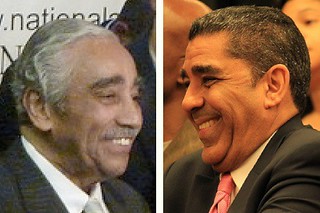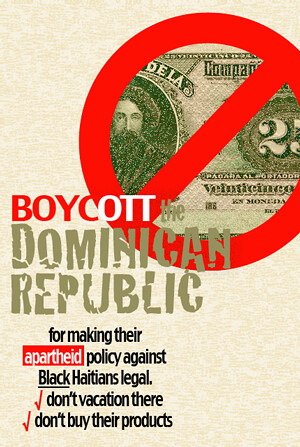Entèvyou ak Dahoud sou dosye Sen Domeng nan
via Lakou NY / lakounewyork.com

Incumbent Harlem Congressman Charles Rangel and his main challenger, State Sen. Adriano Espaillat.
Incumbent Harlem Congressman Charles Rangel and his main challenger, State Sen. Adriano Espaillat, are both guilty of supporting “apartheid” policies against Dominicans of Haitian descent, charged demonstrators outside a televised campaign debate. Under a law passed by the Dominican Republic and endorsed by Rangel and Espaillat, less than 10 percent of 200,000-plus people with roots in Haiti will quality for Dominican citizenship, even though most have never set foot outside the country and speak only Spanish. Daoud Andre, a Haitian community activist, called on Harlemites “not to vote for either of these supporters of apartheid,” and for “people of conscience around the world to boycott Dominican products and services,” including tourism.
Posting the activists emergency call-to-action below for more details.
Note: the debate was picketed on Wednesday June 11, 2014
__________________________________________
NYC Activists to Picket Lehman College Rangel-Espaillat-Walrond Debate to Protest Candidates' support of Apartheid in the Dominican Republic (DR)
__________________________________________
PLEASE FORWARD AND POST ON SOCIAL MEDIA
For generations, Haitians and Dominicans of Haitian descent living in the DR have been living in a situation of apartheid, treated with disdain and discriminated against because of the color of their skin. Massacres, mass deportations, rape, and all sorts of violence have been their lot. On September 23rd, 2013 the Dominican Constitution Tribunal, the country's highest court, decided to strip all Dominicans of Haitian descent born in the DR between 1929 to 2007 of their Dominican citizenship. In response to the outcry from within the country and all over the world, on May 15th, 2014 Dominican President Danilo Medina proposed what he called a humanitarian bill to resolve the situation. Both houses of the Dominican Congress unanimously passed this bill without debate. The problem with this "humanitarian" law is that out of the 210,000 Dominicans of Haitian descent, the DR Government itself claims were affected by the Sept. 23rd ruling only 13,000 at most will get their Dominican citizenship restored. Not even 10% of those supposedly affected will get relief. This is an outrage and must be opposed.
Click here to read Rangel's praise of the Dominican President for this travesty.
Click here to see Espaillat who bested Rangel by actually travelling to the Dominican Republic to praise the Dominican President for the law and actually calls for it to be a model for all countries dealing with difficult immigration issues. We wonder how Espaillat and all the Dominican immigrants who came to the US without papers would feel if the US actually implemented a law like this.
Directions: #4 Subway or D Subway to Bedford Park Blvd
__________________________________________
PLEASE FORWARD AND POST ON SOCIAL MEDIA
Contact: Dahoud Andre, 347-730-3620
Haitian Community Activist
Nellie Bailey, 646-812-5188
Harlem Community Activist
An Emergency Call to Action: Protest Racial Hypocrisy of Espaillat, Rangel and Silence of Walrond in 13th Congressional Race
Activists from around New York City will hold a protest in front of the main entrance of Lehman College (250 Bedford Park Blvd W, New York, NY 10468) on Wednesday June 11th from 5pm to 9pm during a televised debate of candidates running for the 13th Congressional seat: incumbent Charles Rangel, State Senator Adriano Espaillat, and Rev. Michael Walrond. The protest is to let the world know that the real issue of racism in this Congressional Race is not Rangel's comments on Espaillat's Dominican ethnicity but the support of both leading candidates for the Apartheid policy of the Dominican Republic's Government against Haitian immigrants and Dominicans of Haitian descent. The protest will condemn the silence of Rev. Walrond for not speaking out against this human rights travesty.For generations, Haitians and Dominicans of Haitian descent living in the DR have been living in a situation of apartheid, treated with disdain and discriminated against because of the color of their skin. Massacres, mass deportations, rape, and all sorts of violence have been their lot. On September 23rd, 2013 the Dominican Constitution Tribunal, the country's highest court, decided to strip all Dominicans of Haitian descent born in the DR between 1929 to 2007 of their Dominican citizenship. In response to the outcry from within the country and all over the world, on May 15th, 2014 Dominican President Danilo Medina proposed what he called a humanitarian bill to resolve the situation. Both houses of the Dominican Congress unanimously passed this bill without debate. The problem with this "humanitarian" law is that out of the 210,000 Dominicans of Haitian descent, the DR Government itself claims were affected by the Sept. 23rd ruling only 13,000 at most will get their Dominican citizenship restored. Not even 10% of those supposedly affected will get relief. This is an outrage and must be opposed.
Click here to read Rangel's praise of the Dominican President for this travesty.
Click here to see Espaillat who bested Rangel by actually travelling to the Dominican Republic to praise the Dominican President for the law and actually calls for it to be a model for all countries dealing with difficult immigration issues. We wonder how Espaillat and all the Dominican immigrants who came to the US without papers would feel if the US actually implemented a law like this.
Directions: #4 Subway or D Subway to Bedford Park Blvd









